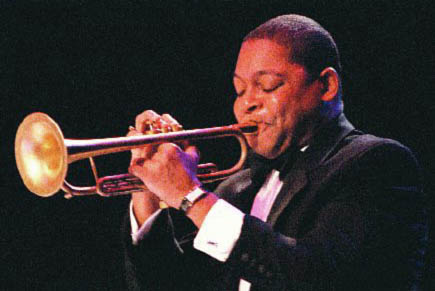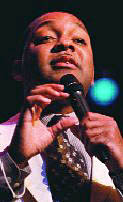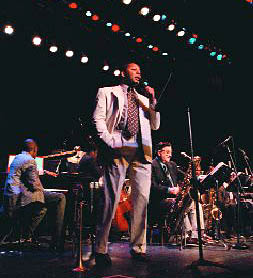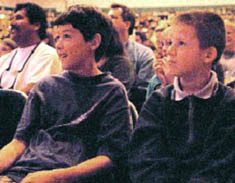Jazzed

All photos: Mickey Pfleger
It was a day for the
ages.
A day, in
fact,
for all
ages.
On a blustery Saturday in March,
Wynton Marsalis and the Lincoln Center Jazz Orchestra came
to Santa Cruz and performed two shows--a free afternoon
workshop for more than 1,000 enraptured schoolchildren and a
sold-out evening concert at which more than 2,000 jazz
lovers bopped, swayed, snapped, and tapped together in the
dark of the downtown Civic Auditorium.
 The
visit by Marsalis and the orchestra, presented by UC Santa
Cruz Arts & Lectures, was the third stop on a world tour
celebrating the centennial of the birth of the grandfather
of jazz, Duke Ellington. The concerts by the 15-member
ensemble were of a caliber rarely seen in Santa Cruz, and
the children's workshop was made possible by support from
the Santa Cruz County Symphony and the Kuumbwa Jazz
Center. The
visit by Marsalis and the orchestra, presented by UC Santa
Cruz Arts & Lectures, was the third stop on a world tour
celebrating the centennial of the birth of the grandfather
of jazz, Duke Ellington. The concerts by the 15-member
ensemble were of a caliber rarely seen in Santa Cruz, and
the children's workshop was made possible by support from
the Santa Cruz County Symphony and the Kuumbwa Jazz
Center.
Artistic director Marsalis, one of the world's most
talented jazz composers and trumpeters, and executive
producer and director Rob Gibson have good reason for
showcasing the work of Ellington. The pianist and composer's
prolific career, during which he produced more than 1,500
pieces, not only spanned 50 years of jazz, but was
instrumental in launching and defining many jazz idioms.
During the evening show, the orchestra traveled nearly
the entire course of jazz history, playing everything from
"Take the A Train," an Ellington classic; to "Lady Mac," one
of Ellington's few waltzes; to the composer's experimental
adaptations of movements from Grieg's "Peer Gynt Suite."
Much in the spirit of Ellington, Wynton Marsalis (son of
pianist Ellis and brother to saxophonist Branford)
downplayed his presence on stage. He had his moments, of
course, but so did each of the other members of this
exceptional ensemble (after all, what's jazz without a few
solos).

"I just want to treat these
kids like my own kids, and invite them into the world of
music. As long as they look back on it and remember that
some man, sometime, told them something about music,
that's enough for me."
The evening crowd was dressed to the nines--the band in
tuxedos, the crowd in dress coats and gowns. But hours
earlier the preferred fashion ran more along the lines of
jeans, sneakers, and baseball caps when area fourth and
fifth graders attended the orchestra's extraordinary
afternoon workshop. One of several education programs
offered by Jazz at Lincoln Center (the nonprofit umbrella
under which the orchestra performs), the workshop is
designed to turn kids on to the magic of jazz.
Marsalis immediately endeared himself to the children
when he apologized for performing a Saturday show. "A lot of
the time, we do this show during the week; so I am really
sorry that we're not getting y'all out of school," he told
them.
 But
there were no complaints as Marsalis captivated his young
audience with a witty and insightful narrative of
Ellington's life and music. As he traced the evolution of
jazz from "polite society music" ("kind of boring," he
confided), through such incarnations as New Orleans jazz,
swing, and improv, the orchestra demonstrated with
music. But
there were no complaints as Marsalis captivated his young
audience with a witty and insightful narrative of
Ellington's life and music. As he traced the evolution of
jazz from "polite society music" ("kind of boring," he
confided), through such incarnations as New Orleans jazz,
swing, and improv, the orchestra demonstrated with
music.
As the concert concluded, Marsalis said in a bemused tone
that he had never, in 15 years of presenting kids'
programming, seen such an attentive and focused
audience.
And though it was, in some ways, all about music, the
afternoon workshop was about much more. "Ellington did what
he loved: He liked it, and it felt good. You can do that
too. Do what you like, not what your friends are doing. Be a
number one yourself, not a number two somebody else," he
told the kids.
Ironically, given the musicaldynasty he grew up in,
Marsalis didn't much like jazz as a child, which may be part
of the reason the educational aspect of his work is so
important to him.
|
 The
afternoon workshop, Jazz for Young People, is just
one of the many free programs presented by Arts
& Lectures for area students. For more
information on these programs, contact Arts &
Lectures at (831) 459-3861 or artslecs@cats.ucsc.edu. The
afternoon workshop, Jazz for Young People, is just
one of the many free programs presented by Arts
& Lectures for area students. For more
information on these programs, contact Arts &
Lectures at (831) 459-3861 or artslecs@cats.ucsc.edu.
|
"Growing up we always had jazz in the house, and my
father would take us to his gigsuntil all hours of the
morning," he said. "But in those days, I wasn't really hip
to it. It wasn't until I was older that I realized that the
music made by great artists like Ellington and Louis
Armstrong contains a beauty, a sophistication, and a hipness
that you don't always find in other forms of music."
And now, as both educator and performer, Marsalis
transfuses that appreciation into others. "I just want to
treat these kids like my own kids, and invite them into the
world of music. As long as they look back on it and remember
that some man, sometime, told them something about music,
that's enough for me."
--Barbara McKenna
|

 The
visit by Marsalis and the orchestra, presented by UC Santa
Cruz Arts & Lectures, was the third stop on a world tour
celebrating the centennial of the birth of the grandfather
of jazz, Duke Ellington. The concerts by the 15-member
ensemble were of a caliber rarely seen in Santa Cruz, and
the children's workshop was made possible by support from
the Santa Cruz County Symphony and the Kuumbwa Jazz
Center.
The
visit by Marsalis and the orchestra, presented by UC Santa
Cruz Arts & Lectures, was the third stop on a world tour
celebrating the centennial of the birth of the grandfather
of jazz, Duke Ellington. The concerts by the 15-member
ensemble were of a caliber rarely seen in Santa Cruz, and
the children's workshop was made possible by support from
the Santa Cruz County Symphony and the Kuumbwa Jazz
Center.
 But
there were no complaints as Marsalis captivated his young
audience with a witty and insightful narrative of
Ellington's life and music. As he traced the evolution of
jazz from "polite society music" ("kind of boring," he
confided), through such incarnations as New Orleans jazz,
swing, and improv, the orchestra demonstrated with
music.
But
there were no complaints as Marsalis captivated his young
audience with a witty and insightful narrative of
Ellington's life and music. As he traced the evolution of
jazz from "polite society music" ("kind of boring," he
confided), through such incarnations as New Orleans jazz,
swing, and improv, the orchestra demonstrated with
music. The
afternoon workshop, Jazz for Young People, is just
one of the many free programs presented by Arts
& Lectures for area students. For more
information on these programs, contact Arts &
Lectures at (831) 459-3861 or
The
afternoon workshop, Jazz for Young People, is just
one of the many free programs presented by Arts
& Lectures for area students. For more
information on these programs, contact Arts &
Lectures at (831) 459-3861 or